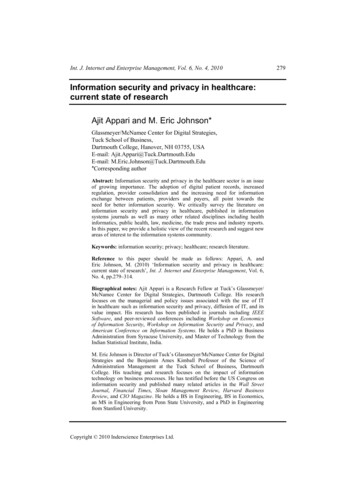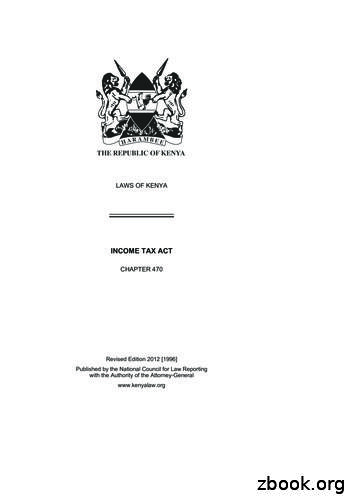University Of Massachusetts Dartmouth ACT 673-01 .
University of Massachusetts DartmouthACT 673-01 – Government & Non-Profit AccountingSpring 2017Course InformationCourse Name:Government and Nonprofit AccountingCourse ID:ACT 673 - 01Semester:Spring 2020Mode:onlineInstructor InformationInstructor:Dawn M. Gupta CPA MBAEmail:Dgupta@umassd.eduPhone:508-999-8748Office HoursTuesday 9:00-11:00 am Thursday 9:00-10:30 Monday 5:30-6:30 CCB 311Class Schedule, Office Hours and SaturdayOnlineCourse DescriptionA study of non-corporate organizations with primary focus on governments, hospitals, college and universities andvoluntary health and welfare organizations. Coverage will include principles of fund accounting, financial reporting,budgeting and auditing governmental and not-for-profit organizations. In addition, topics related to operating abusiness as a partnership will be included.Prerequisite:ACT-512Course Credits:3-creditsRequired Text:Jacqueline Reck and Suzanne Lowensohn, Accounting for Governmental & Nonprofit Entities, 17th , McGraw HillEducationISBN: 978-0-07-802582-2Course ObjectivesUpon completing this course, you will :
1. Understand the unique characteristics of government and nonprofit organizations, as well as the uses ofgovernment financial statement information.2. Understand the GASB state and local government financial reporting model, identify the three major categories offunds, and identify the basis of accounting used.3. Know the differences and similarities between the General Fund and the Special Revenue Funds, as well as theirmeasurement focus and basis of accounting used. Understand the related adjusting and closing entries for thesetwo funds.4. Understand basic budgetary accounting and reporting requirements, commonly used budgeting terminology, andthe procedures involved in preparing and adopting a budget.5. Discuss and apply modified accrual revenue recognition criteria in simple situations, and understand the levy,collection, revenue recognition and enforcement of property taxes and other taxes.6. Define and apply governmental fund expenditure recognition, account for debt service and capital outlayexpenditures.7. Understand the nature and purpose of Capital Projects Funds and the typical budgeting and budgetary reportingissues related to these funds.8. Understand the nature and purpose of Debt Service Funds and their basic accounting and reporting requirements.9. Account for and report general infrastructure capital assets as well as their financial reporting requirements.Understand the nature and use of Permanent Funds.10. Identify when Enterprise Funds should be used and understand the propriety fund accounting principles.11. Understand the nature and usage of Internal Service Funds and the four types of Fiduciary Funds.12. Identify a Government’s basic financial statements and understand the concept and content of requiredsupplementary information (RSI).13. Understand the professional responsibilities and ethical standards of the accounting profession.14. Possess a strong understanding of accounting practices and knowledge across the functional areas of accounting.Communication PlanExpectations for electronic communicationPlease use email *ONLY* when the subject is of a personal and confidential matter. If the question you ask is of a naturethat even one other person in the course could benefit from the answer, post the question in the appropriate discussionboard forum.I check my email several times daily. I do try to check it once in the evening, time permitting. Generally, I respond to emailsimmediately, but in some circumstances, I may need up to 24 hours. That will not be the norm though. I do check emailsperiodically on the weekend whenever possible.
Methods of InstructionEvaluation and Grading Breakdown:Chapter Assignments/ParticipationExams I,II and Final @ 20% eachProjectTotal10%60%30%100%Project:Please hand in all Project assignments at semesters end in one printed packet. These are due the last day of classes.The weekly homework assignments are due at weeks end. Although it is ideal to submit timely, I do not take off pointsfor late homework assignment submissions.A: 92-100; A-:89-92; B :86-89; B: 82-86; B-: 79-82; C : 76-79; C: 72-76; C-: 69-72; D : 66-69; D: 62-66; D-: 60-62; F: below60Incomplete PolicyAccording to the university catalogue, an incomplete may be given only in exceptional circumstances at the instructor'sdiscretion. The student must be passing at the time of the request or be sufficiently close to passing. If the work is notcompleted within one year of the recording of the incomplete grade, the grade will become an F(I). The incompletepolicy for this course is that at least 70% of the course must be already completed and an exceptional circumstance (i.e.medical issue) must exist. If you feel you require an incomplete for an exceptional reason, you need to email me andstate your reasons for the incomplete in writing. We will then decide on a course of action.Course ConductUMass Dartmouth policies regarding equal opportunity, discrimination, harassment, and sexual violence apply to alllearning environments wherever they are located and from wherever they are taught. This applies to all UE face-to-face,off campus, blended, and online courses. Please see the Office of Diversity, Equity & Inclusion brochure for informationat duct/.Student Academic Integrity PolicyAll UMass Dartmouth students are expected to maintain high standards of academic integrity and scholarly practice. TheUniversity does not tolerate academic dishonesty of any variety, whether as a result of a failure to understand requiredacademic and scholarly procedure or as an act of intentional dishonesty.A student found responsible of academic dishonesty is subject to severe disciplinary action which may include dismissalfrom the University. The procedure for responding to incidents of academic dishonesty may be found in Section III of thisdocument. You may also refer to the Student Handbook for information about the judicial process.A high standard of academic integrity promotes the pursuit of truth and learning and respect for the intellectualaccomplishments of others. These are values that are fundamental to the mission of this University. Such values areundermined by academic dishonesty.
Academic freedom is a fundamental right in any institution of higher learning. Honesty and integrity are necessarypreconditions of this freedom. Academic integrity requires that all academic work be wholly the product of an identifiedindividual or individuals. Joint efforts are legitimate only when the assistance of others is explicitly acknowledged anddeemed appropriate by the instructor of the course. Ethical conduct is the obligation of every member of the Universitycommunity, and breaches of academic integrity constitute serious offenses.Maintenance of the standards of academic integrity and the successful administration of this policy depend on themutual cooperation of faculty and students.Faculty cooperation is essential for successful application of the procedures defined by this Academic Integrity Policy.Faculty members promote academic integrity by making clear on their syllabi their expectations concerning homeworkassignments, collaborative student efforts, research papers, examinations, computer-based infractions, and the like.Efforts should be made to detect and to prevent cheating and plagiarism in all academic assignments. If faculty membershave evidence of academic dishonesty, they are expected to report such evidence promptly.Students must assume responsibility for maintaining honesty in all work submitted for credit and in any other workdesignated by the instructor of the course. Students are also expected to report incidents of academic dishonesty to theinstructor or dean of the instructional unit.The intent of this policy is to make clear the standards of academic integrity at UMass Dartmouth.*For additional information on violations, infractions, and consequences visit the UMass Dartmouth Student AcademicIntegrity Policy at the link ortingform/Center for Access and SuccessIn accordance with University policy, if you have a documented disability and require accommodations to obtain equalaccess in this course, please meet with the instructor at the beginning of the semester and provide the appropriatepaperwork from the Center for Access and Success. The necessary paperwork is obtained when you bring properdocumentation to the Center, which is located in Liberal Arts, Room 016; phone: 508.999.8711.Resources for UMass Dartmouth StudentsTutoringIf you are having difficulty with the class please: Contact me directly using the contact information listed at the top of this document.Contact the Academic Resource Center (ARC) for support:o Academic Resource Center, Liberal Arts - Room 7o Phone: 508.999.8708, Fax: 508.910.6404For help with writing assignments you can also make use of online writing tutoring.o eTutoring can be accessed at -submission-formfor-online-tutoring/Course Schedule
Week/Date BeginningUnit of Instruction TopicResponsibilitiesWeek 11/21-1/25Chapter 1: Intro to Governmental and NonprofitAccountingReading: Ch 1Activity: pg. 16; 1-16 Project**** Please save the CAFR from this chaptersexercise. It will be useful in the chaptersto follow.Week 21/26-2/1Chapter 2: Principles of Accounting andFinancial Reporting for State andLocal GovernmentsAssignment: Pg. 17-18, (1-18) & ( 119)Reading: Ch 2Activity: pg. 62; 2-14 ProjectAssignment: Pg.64-66, ( 2-16, 2-17, 218, 2-19, 2-10)Week 32/2-2/8Chapter 3: Gov’t Operating StatementAccounts: Budgetary AccountingReading: Ch 3Activity: pg. 102; 3-16 ProjectAssignment: Pg. 105-108, (3-18, 319,3-20,3-21,3-22)Week 42/9-2/15Chapter 4: Accounting for Gov’t OperatingActivities: Illustrative transactionsReading: Ch 4Activity: pg. 156; 4-15 ProjectAssignment: Pg. 159-163, ( 4-17,418,4-20, 4-22)Week 52/16-2/22Chapter 5: Accounting for General CapitalAssets and Capital ProjectsReading: Ch 5Review for examActivity: pg. 196; 5-15 ProjectAssignment: Pg. 200-202, (5-17,5-19,5-21)Week 62/23-2/29Exam I: Chapters 1,2,3,4Reading:Activity:Assignment:Week 73/1-3/7Chapter 6: Accounting for L/T Liabilities andDebt serviceReading: Ch 6Activity: pg. 244; 6-15 ProjectAssignment: Pg. 245-247, (6-16,6-17)
Week 83/8-3/14Spring BreakWeek 93/15-3/21Chapter 7: Accounting for the Business-TypeActivities of State and LocalGovernmentsReading: Ch 7Activity: pg. 292; 7-15 ProjectAssignment: Pg. 297, (7-18)Week 103/22-3/28Chapter 8: Accounting for Fiduciary ActivitiesAgency and Trust FundsReading: Ch 8Exam II ReviewActivity: pg. 340; 8-15 ProjectAssignment: Pg. 341-344, (8-16, 8-17)Week 113/29-4/4Exam II: Chapters 5,6,7,8Week 124/5-4/11Chapter 9: Financial Reporting of State and LocalGovernmentsReading: Ch 9Activity: pg. 397; 9-15 ProjectAssignment: Pg. 399, (9-17) Pg. 401,(9-20)Week 134/12-4/18Chapter 13: Accounting For NonprofitOrganizationsReading: Ch 13Activity: No Project AssignmentAssignment: Pg. 563-567, (13-14,1315,13-16,)Week 144/19-4/25Chapter 15: Accounting For Colleges andUniversitiesReading: Ch 15Activity: No Project AssignmentProject DueWeek 154/26-5/2Final Exam (Ch. 9,13,15)Assignment:Reading:Activity:Assignment:
Jacqueline Reck and Suzanne Lowensohn, Accounting for Governmental & Nonprofit Entities, 17th , McGraw Hill Education ISBN: 978-0-07-802582-2 Course Objectives Upon completing this course, you will : 1. Understand the unique characteristics of government and nonprofit organizations,
Jun 06, 2008 · Ajit Appari and M. Eric Johnson* Glassmeyer/McNamee Center for Digital Strategies, Tuck School of Business, Dartmouth College, Hanover, NH 03755, USA E-mail: Ajit.Appari@Tuck.Dartmouth.Edu E-mail: M.Eric.Johnson@Tuck.Dartmouth.Edu *Corresponding author Abstract: Information
Is the UMass Dartmouth MBA program accredited? The MBA program at UMass Dartmouth is part of the Charlton College of Business, which is fully AACSB accredited and featured in the Princeton Review's 'The Best 301 Business Schools: 2010 Edition'. U.S. News and World Report ranked UMass Dartmouth as #1 among New England public universities with
6 of 2001, Act No. 7 of 2002, Act No. 15 of 2003, Act No. 4 of 2004, Act No. 6 of 2005, Act No. 10 of 2006, Act No. 9 of 2007, Act No. 8 of 2008, Act No. 8 of 2009, Act No. 10 of 2010, Act No. 4 of 2012.] PART I - PRELIMINARY 1. Short title and commencement This Act may be cited as the Income Tax Act, 1973 and shall, subject to the
Act I, Scene 1 Act I, Scene 2 Act I, Scene 3 Act II, Scene 1 Act II, Scene 2 Act II, Scene 3 Act III, Scene 1 20. Act I, Scene 1–Act III, Scene 1: Summary . Directions: Summarize what you what you have read so far in Divided Loyalties (Act I-Act III, Scene1). 21. Act III, Scenes 2 and 3:
LAW BOOK Act 358 of 1955 As Amended By Act 490 of 1961 Act 403 of 1965 Act 400 of 1969 Act 566 of 1973 Acts 532 & 644 of 1975 Act 465 of 1987 Act 1228 of 1991 Act 1056 of 1993 Act 771 of 1995 Act 512 of 1997 Acts 595,596 & 680 of 2003 Act 207 of 2005 Act 223 of 2007 Issued by ARKANSAS STAT
Mitigating Political Bias in Language Models Through Reinforced Calibration Ruibo Liu,1 Chenyan Jia, 2 Jason Wei, 3 Guangxuan Xu, 1 Lili Wang, 1 Soroush Vosoughi 1 1 Department of Computer Science, Dartmouth College 2 Moody College of Communication, University of Texas at Austin 3 ProtagoLabs ruibo.liu.gr@dartmouth.edu, soroush.vosoughi@dartmouth.edu
Steve Calvert graduated from Dartmouth College, served in the Navy during Vietnam, then earned a Ph.D. in English at Rutgers. His career in alumni relations started at Dartmouth, where he focused on "alumni continuing education" and started ILEAD, now OSHER@Dartmouth. As director of alumni relations at
m. Figure 6.11: Cross section of area between Comm. Ave. WB and EB n. Figure 6.12: Timing plan for Comm. Ave. WB at Dartmouth o. Table 6.3: Traffic Count on Dartmouth St. at Comm. Ave. WB p. Figure 6.13: Typical Cross Section between Comm. Ave. WB and Beacon St. q. Figure 6.14: Rendering of Separated Bicycle Lane along Dartmouth Street r.























